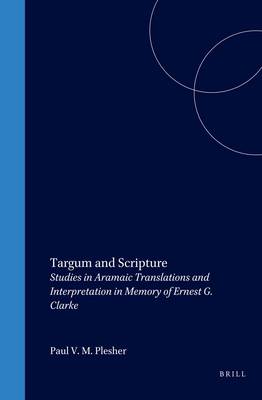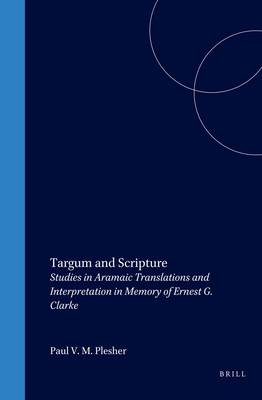
- Afhalen na 1 uur in een winkel met voorraad
- Gratis thuislevering in België vanaf € 30
- Ruim aanbod met 7 miljoen producten
- Afhalen na 1 uur in een winkel met voorraad
- Gratis thuislevering in België vanaf € 30
- Ruim aanbod met 7 miljoen producten
Zoeken
Targum and Scripture
Studies in Aramaic Translations and Interpretation in Memory of Ernest G. Clarke
€ 305,45
+ 610 punten
Omschrijving
If Greek was the language by which Palestinian Jews talked to the Empire, then Aramaic and Hebrew were the languages by which they talked to themselves. In this context, what resulted when they translated the Hebrew Bible into Aramaic? Moments of the inner Jewish conversation about the meaning and relevance of Hebrew Scriptures frozen in Aramaic renditions.
The scholars in this volume use these Aramaic translations, known as the Targums, like dioramas, peering through them to glimpse these moments in the development of Judaism and its theology. Dedicated to Ernest G. Clarke, the essays explore the variety of interpretations preserved in the different Targums from the Second Temple and post-Temple periods during which they were composed.
The scholars in this volume use these Aramaic translations, known as the Targums, like dioramas, peering through them to glimpse these moments in the development of Judaism and its theology. Dedicated to Ernest G. Clarke, the essays explore the variety of interpretations preserved in the different Targums from the Second Temple and post-Temple periods during which they were composed.
Specificaties
Betrokkenen
- Uitgeverij:
Inhoud
- Aantal bladzijden:
- 330
- Taal:
- Engels
- Reeks:
- Reeksnummer:
- nr. 2
Eigenschappen
- Productcode (EAN):
- 9789004126770
- Verschijningsdatum:
- 27/11/2002
- Uitvoering:
- Hardcover
- Formaat:
- Genaaid
- Afmetingen:
- 170 mm x 247 mm
- Gewicht:
- 802 g

Alleen bij Standaard Boekhandel
+ 610 punten op je klantenkaart van Standaard Boekhandel
Beoordelingen
We publiceren alleen reviews die voldoen aan de voorwaarden voor reviews. Bekijk onze voorwaarden voor reviews.







